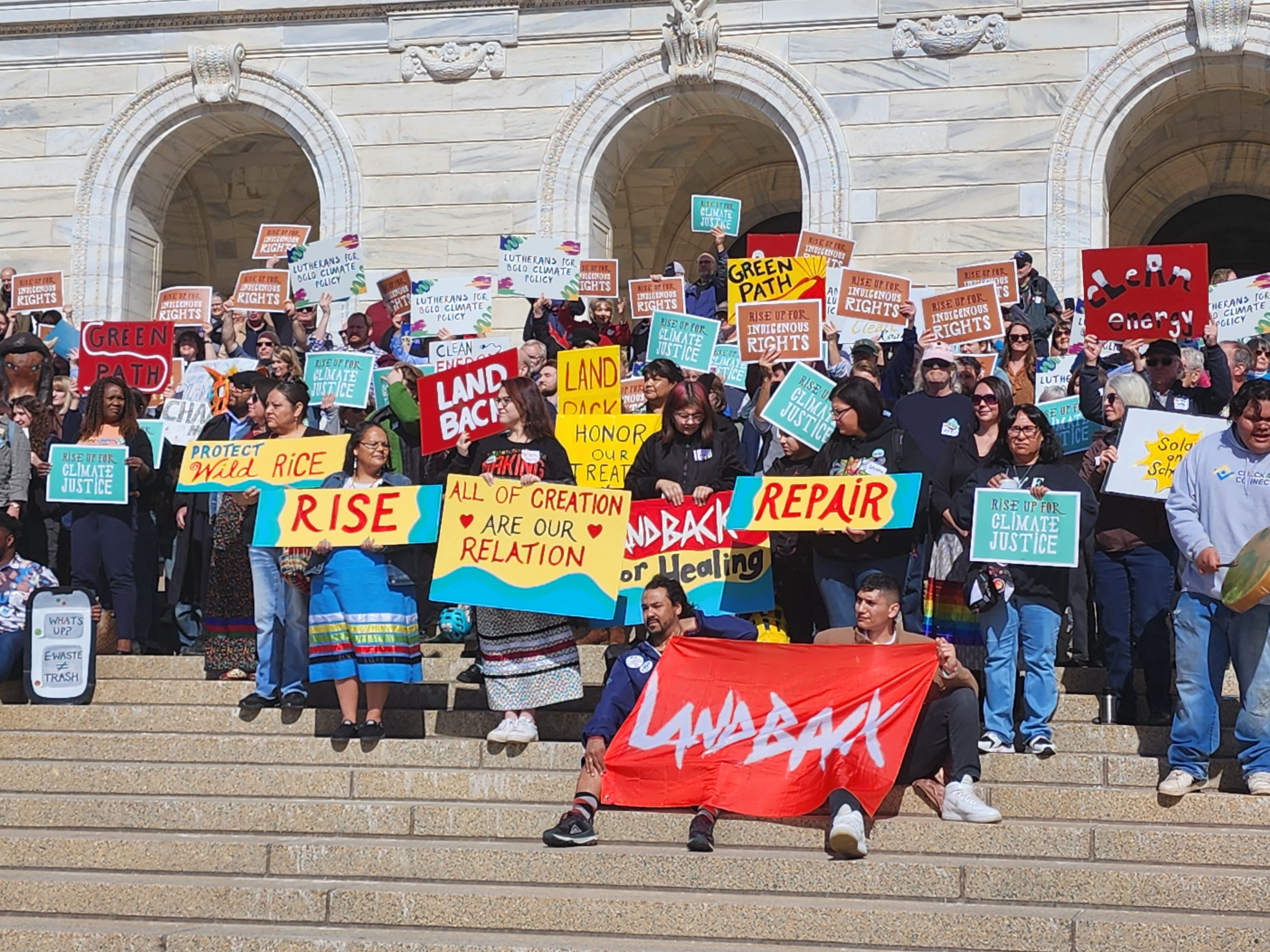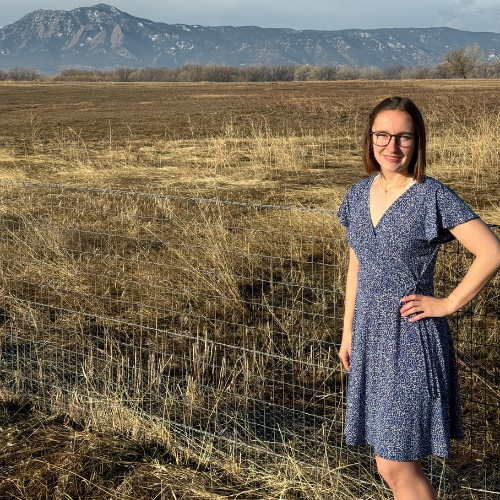
Line 3 Protest March, Ron Turney
Natural Hazards Center Graduate Research Assistant Brigid Mark is ending the spring semester strong, earning a number of honors from across the University of Colorado Boulder for her scholarship and activism.
Mark, a doctoral candidate in the Department of Sociology and research assistant at the Natural Hazards Center, conducts research on Native political issues and social movements. Her work as a scholar-activist began when she joined the movement against the Line 3 tar sands pipeline as an undergraduate student at the College of Saint Benedict and Saint John’s University in Minnesota. She has continued these efforts as a graduate student at the University of Colorado Boulder.
 Brigid Mark during her time as a Pipeline Resistance volunteer for Minnesota 350
Brigid Mark during her time as a Pipeline Resistance volunteer for Minnesota 350
Her recently published paper “Following Indigenous Leadership: Addressing Power Inequalities Between White and Indigenous Activists in the Movement to Stop Line 3” is the culmination of two dozen interviews and four years of ethnographic observation from within the movement.
Graduate Student Excellence
Mark’s paper was recently selected as the inaugural recipient of the Ed and Martha Greenberg Graduate Student Excellence Award, which recognizes an outstanding graduate research paper from a student associated with the Institute of Behavioral Science (IBS).
As Mark’s scholarship underscores, the resistance to the Line 3 pipeline allied thousands of diverse activists, motivated by their concerns about potential water pollution, accelerated climate change, and the violation of Indigenous sovereignty in Anishinaabe territories. Mark’s research seeks to understand the complex and ongoing ways that Indigenous-white members worked to address power imbalances within the movement.
Mark’s research questions were informed by regular and ongoing conversations with activists. Before publishing the work, she reached out to ask for reviews from movement leaders and activists, including some of the Anishinaabe women and two-spirit activists who led encampments during the resistance.
The analysis in the paper argues that the movement against Line 3 successfully followed Indigenous leadership and implemented many of the suggestions that intersectionality scholars have made for reducing inequalities and racial power imbalances.
“I think of knowledge creation as a collective process… It's really an honor to be able to highlight the teachings and learnings activists shared with me,” Mark said.
Natural Hazards Center Director Lori Peek, who is Mark’s dissertation co-advisor, nominated her for the award, noting that Mark’s commitment to the possibility of decreasing inequality through social movements converges with Greenberg’s groundbreaking work on evaluating workplace democracy.

Rally and Lobby Day for Indigenous Rights and Climate Justice, Photo Courtesy of Rise and Repair Alliance
Peek also praised Mark's scholarship as example of progress toward conducting more ethical research with Indigenous communities, who, because of unethical research practices by outsiders, are often extremely distrustful of white researchers.
“She spent a great deal of time developing strong and lasting relationships in the field,” Peek said. “Her ethical stance and commitment to address social problems strengthens and complements her research, increasing both research depth and attentiveness to participant wellbeing.”
Mark and activist collaborators are in the process of co-designing a short booklet to summarize the paper’s key findings, with illustrations from Jackie Fawn, Yurok, Washoe, and Surigaonon graphic illustrator.
Advancing Campus Sustainability
Mark’s commitment to social and environmental justice movements also extends to her extracurricular commitments. This spring, she and a multidisciplinary team of graduate students were awarded the 2025 Campus Sustainability Award for Student Leadership. These students took the initiative to co-develop and co-teach a new course on climate action planning.
The goal of the course was to engage undergraduate CU Boulder students in improving the data collection, analysis, and emission reduction strategies of the university’s Climate Action Plan.
“Students often learn about the gravity of climate change without the possibility of participating in solutions, which can be depressing and overwhelming,” Mark said. “But teaching this course has showed me that students are creative and resourceful and will step up when given the tools to make change.”
Students who were enrolled in the course indicated how much they appreciated the opportunity to be part of real-world solutions to climate change and to make a difference on their campus through the course. Some stated that it was their favorite class taken at CU so far.
Modeling Feminist Scholarship
 Brigid Mark in Boulder, CO
Brigid Mark in Boulder, CO
Mark’s scholarship and activism achievements were dually recognized through the Betsy Moen “Walk the Talk” Award, named for Elizabeth “Betsy” Moen Mathiot. Moen was an associate professor of sociology at University of Colorado Boulder known for her legacy of feminist scholarship and social action. The annual award honors a student in the Department of Sociology who reflects Moen’s extraordinary legacy.
“I am deeply grateful. My approach is shaped by the feminist mentors—both academics and activists—I have had over the years,” Mark said. “Betsy Moen Mathiot’s work serves as an impressive model for research and activism that I hope to follow.”
These aspirations underpin Mark’s doctoral dissertation work, which focuses on “land rematriation,” a term coined by Indigenous feminists. For Mark, feminist practice, relationship building, and a commitment to contribute to social change make up the foundation of high-quality, in-depth, and ethical research.
“The urgency of social and environmental crises means that good research must contribute to addressing social and environmental problems,” Mark said. “I am committed to contributing, alongside fellow organizers and academics, to this type of work for the rest of my life.”